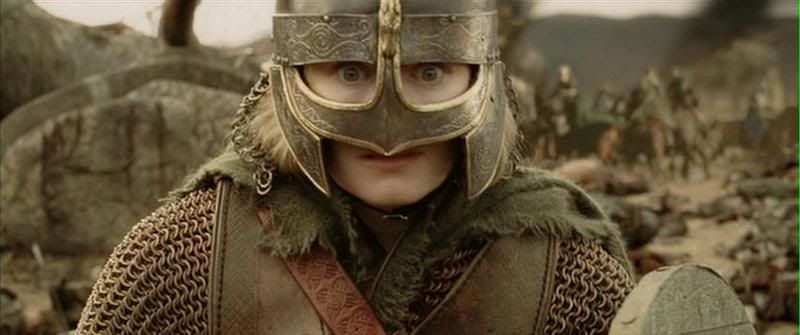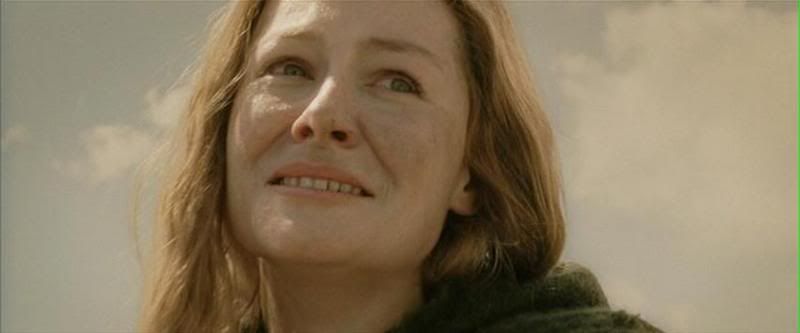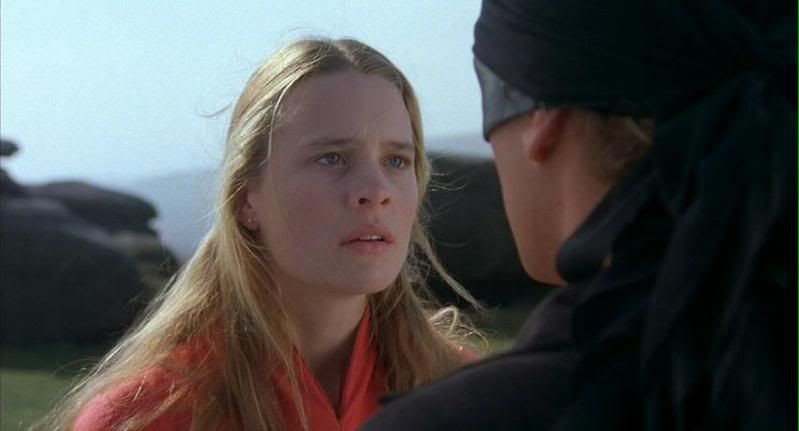A little to the left facing them stood she whom he had called Dernhelm. But the helm of her secrecy had fallen from her, and her bright hair, released from its bonds, gleamed with pale gold upon her shoulders. Her eyes grey as the sea were hard and fell, and yet tears were on her cheek. A sword was in her hand, and she raised her shield against the horror of her enemy's eyes.
...the face of one that goes seeking death, having no hope.
Still she did not blench: maiden of the Rohirrim, child of kings, slender but as a steel blade, fair yet terrible.
Quoted from The Return of the King, Book V chapter 6.
So, on the zee pictures:

Um, it looks like she's blenching to me.
Also, how hard is the original chronology of the fight to follow, anyway? Theoden is down, she stands between the kings, talk talk talk, she laughs and takes off her helm, the Witch-King's beast leaps into the air and then falls on her, she strikes off its head, she springs back, the Black Rider rises, cries and breaks her arm with his mace, she falls to her knees, he stoops for the kill, Merry stabs him in the back of the knee, he stumbles, she totters up and stabs him, he is destroyed and she falls on his mantle. But nooooo, Jackson has to rearrange it all: Theoden goes flying - whee! more exciting, see?, Witch-King tells it to eat away, Eowyn runs in between (so far, so good), dialogue is exchanged (but in the wrong order), beast charges (no flying), Eowyn chops off its head, the Rider rises, Eowyn blenches ferociously, the morningstar (not mace!) whirls about, is parried weakly once and then breaks her shield and arm, she falls back on the dead horse, the Nazgul grabs her by the throat and threatens her with terrible dialogue, Merry stabs him the back of the knee, Eowyn falls back again, then stands up all nice and tall and proclaims her non-man-ness, then draws back her arm for a very drama...er lame looking stroke, which takes way too long, and then her sword goes flying (not splintered!), the Witch-King implodes, she holds her arm looking rather dumb...really, why the changes? I understand that some things are necessary, but the scene is visual and exciting in the book. These things were really unnecessary.
I suppose this might be counted as not blenching, but at this point, she's supposed to be tottering, and instead we get inspirational feminist quips:

Bother. At least she looks about right, though I think the lighting in this scene is too warm. I always imagine this scene as rather cold, grey-blue, matching the despair of her mood. Oh, and lots of upward camera angles, both to show Merry's POV and to emphasize her heroism without lame dialogue additions.
Funnily enough, I was watching The Princess Bride, and I think that Buttercup in the first 30 minutes of the film is a lot better Eowyn than Eowyn in The Return of the King. Right look, right attitude, and even the same description - eyes as grey as the sea (oh, wait, she's describing Wesley. Never mind - but the wording is exactly the same;-).
So, this is how I think Eowyn should look in that scene:

